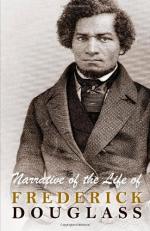|
This section contains 8,945 words (approx. 30 pages at 300 words per page) |

|
SOURCE: MacKethan, Lucinda H. “From Fugitive Slave to Man of Letters: The Conversion of Frederick Douglass.” Journal of Narrative Technique 16, no. 1 (winter 1986): 55-71.
In the following essay, MacKethan explores Douglass's struggle to establish mastery over language and literature as a means of achieving full human and civil rights.
To be an “American slave” was to be a man denied manhood in a country which defined men as beings endowed by their creator with the inalienable right to freedom. To be a “fugitive American slave” was to be a man seeking to claim title to the specifically American definition of man by finding a “territory” where that definition would legally apply. And to be a “fugitive American slave narrator” was to be a man seeking in a written document to prove that the free territory had successfully been appropriated through language, so that the American definition of man and...
|
This section contains 8,945 words (approx. 30 pages at 300 words per page) |

|


